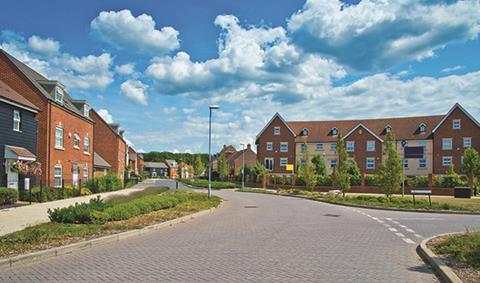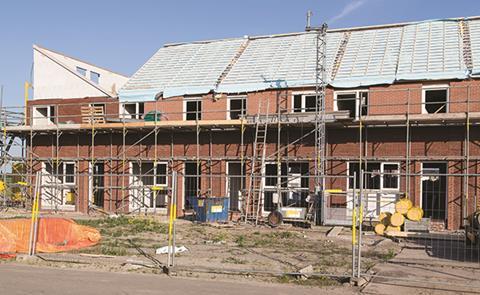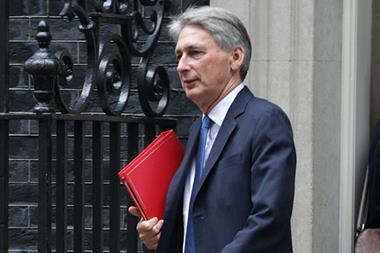The government’s housing white paper has been fraught with delays.

It was initially due to come out alongside the Autumn Statement in November. That soon morphed into a December target and now it is expected to be published later this month - and only after being rubber-stamped by 10 Downing Street.

Ministers have painted a picture of a landmark document that will provide the framework for housing policy for the foreseeable future, but some in the industry are worried that it will be a damp squib. So what can we expect?
If housing minister Gavin Barwell and communities secretary Sajid Javid are to be believed, the document will contain punitive measures for developers aimed at speeding up delivery.
In November, Barwell spoke of “carrots and sticks” to boost build-out rates and raised the spectre of a tax on development aimed at capturing some of the uplift in land value that developers receive through planning permission.
In the same month, Javid pledged to end the “stranglehold” large builders have on the market, saying: “It’s time to stop sitting on land banks and stop delaying build-out.”
Keeping developers on their toes
Some in the industry are concerned about such language, perhaps with good reason when one of the measures understood by Property Week to be on the cards is fines for developers that don’t meet specified build-out rates on sites.
The government has been closely examining the planning model adopted in central Bedfordshire early last year, in which build-out rates are agreed between the council and developers and written into planning permissions.
Developers who miss build-out targets currently face the prospect of having their planning permission revoked, but Ken Matthews, chair of the council’s development management committee, says that fines might be a better idea.
“At the end of the day, if we revoke the planning permission then completions won’t happen, so a fine could be the answer,” he explains. “[Developers] don’t like their pockets being hit.”
Such a policy would be “untested and onerous”, says Home Builders Federation planning director Andrew Whitaker. He adds: “There can often be unforeseen and unintended consequences that could threaten the progress being made and the significant increases in housing supply we have seen over the past three years.”
Attempts to try and speed up build-out rates could very easily have the opposite effect - David Thomas, Barratt
David Thomas, chief executive of the UK’s largest housebuilder Barratt, warns that “attempts to try and speed up build-out rates could easily have the opposite effect”. “The industry knows it has to step up and help deliver the homes the country needs and we understand the need for transparency to prove that we are on the case, but it’s vital that policy doesn’t end up reducing development trying to solve a problem that isn’t actually there in the first place,” he adds.
Industry concerns aren’t falling on deaf ears in Whitehall. One of the reasons for the delay of the white paper is the fear of unintended consequences, according to sources.

Ministers are struggling to form a coherent policy that as well as being tough on developers - as per the language of the ministers - ensures that housebuilders actually deliver more homes, they add.
But the government is not just considering getting tough on developers; local authorities are also in its sights. The government is keen to get land allocated for housing as quickly as possible - and that means ensuring local authorities create coherent, detailed local plans.
As Property Week reported last month, the government plans to ban councils without a local plan from bidding for a slice of the £2.3bn housing fund announced in the Autumn Statement.
In another sign that the government is prepared to look at the housing conundrum in the round, rather than just bash developers, in November it was reported that the white paper would encourage councils to make more green-belt land available for housing, something the industry has long called for.
Increasing supply
“Everything that we will see will be focused on how they can increase housing supply to the market,” says Faraz Baber, a member of the government’s planning sounding board and a director at consultant Terence O’Rourke.
He points to the recent evolution of former regulatory body the Homes and Communities Agency into a purely delivery-focused organisation as evidence of this trend. “If that doesn’t signal where the government is going, I don’t know what does,” he says.
Others are encouraged by the new government’s emphasis on increasing supply no matter the tenure, an approach that contrasts starkly with the home ownership obsession that characterised previous Conservative government regimes.
“The direction of travel for housebuilding and housing supply has been positive for some time,” says Barratt’s Thomas. “Ministers were quick to get on top of their briefs and have been accessible to every part of the industry.”
Diversification of housing players
The government is also keen to increase the diversity of players in the housing sector and sources suggest that housing associations will be among the biggest winners. The government has already pledged extra money - £1.4bn nationally - to deliver more affordable homes, and there could be further encouragement to come.
“We didn’t have a great relationship with government not so long ago, but things have changed completely,” says David Montague, chief executive of housing association L&Q.
“It just feels so different. We really feel like strategic partners. There is a strong sense among housing associations that we now must step forward and deliver.”
While the white paper may contain some sour notes for the industry, most think that the government’s renewed focus on supply has given them a clearer vision of the steps needed to speed up building. At the very least, the housing white paper will provide some certainty to the industry - and certainty is what is required to solve the housing crisis.






























No comments yet